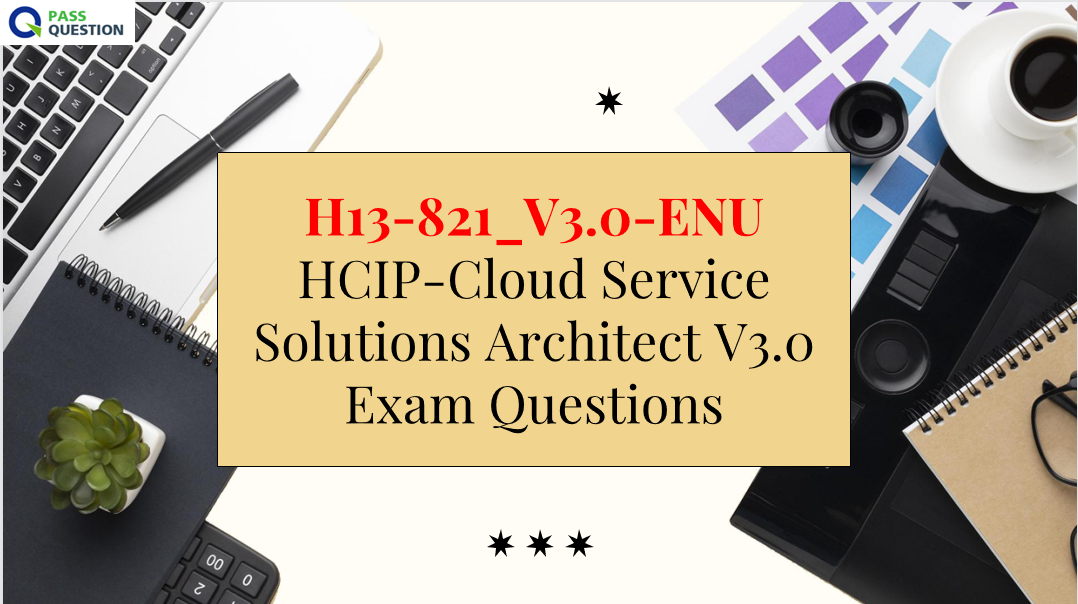H13-821_V3.0-ENU HCIP-Cloud Service Solutions Architect V3.0 Exam Questions
The HCIP-Cloud Service Solutions Architect V3.0 exam is a valuable certification that can help you advance your career in cloud computing. By passing this H13-821_V3.0-ENU exam, you can prove your competence and credibility as a cloud service architect using Huawei Cloud services. PassQuestion provides you with the latest and valid H13-821_V3.0-ENU HCIP-Cloud Service Solutions Architect V3.0 exam questions that are collected and organized by top certified IT professionals and experts. You can use these H13-821_V3.0-ENU HCIP-Cloud Service Solutions Architect V3.0 Exam Questions to test your knowledge and skills before taking the real exam.

Huawei Certification HCIP-Cloud Service Solutions Architect V3.0 Certification Exam
Exam Code: H13-821
Exam Name: HCIP-Cloud Service Solutions Architect V3.0
Exam language: ENU/CHS
Question Type: Single Answer, Multiple Answer, True-false Question, Fill in the blank answers, Drag and drop item
Exam fees: 300 USD
Exam Duration: 90min
Passing score/Total score: 600/1000
Exam Content
1.Enterprise Application Architectures and Cloud Technologies 5%
2.Cloud-based Architecture Design of Conventional Applications 50%
3.Cloud Native Application Architecture Design 30%
4.Huawei Cloud O&M Solution 10%
5.Huawei Cloud Innovations and Solutions 5%
Knowledge Points
Enterprise Application Architectures and Cloud Technologies
- Background of Enterprise Cloud Migration
- Principles of Enterprise Application Architecture Design
- Cloud-based Architecture Design Case Study
Compute Service Planning
- Compute Service Overview
- Compute Service Planning
- IMS Planning
- AS Planning
Network Service Planning
- Network Service Overview
- Network Planning
- Network Access
Storage Service Planning
- Storage Service Overview
- Storage Service Planning
- Content Delivery Network
- Backup Solution Planning
- DR Solution Planning
Database Service Planning
- Introduction to Database Services
- Cloud Database Services
- Database Migration
Cloud Security Service Planning
- Cloud Security Design and Huawei Cloud Security System
- Workload Security
- Network Security
- Application Security
- Data Security
- Security Management
Cloud Native Technologies
- Cloud Native Concepts and Background
- Open Source Container Technologies
- Huawei Cloud Container Services
- Serverless Overview
Cloud Native Application Architecture
- Cloud Native Applications and Microservices
- Mainstream Frameworks of Cloud Native Applications
- Huawei Cloud Native Application Solutions
Huawei Cloud O&M Solution
- Cloud O&M Overview
- Open Source O&M Tools
- Huawei Cloud O&M Services
Huawei Cloud Innovations and Solutions
- Overview of Huawei Cloud Innovations and Solutions
- Huawei Cloud EI Solution
- Huawei Cloud IoT Solution
- Huawei Cloud Application and Data Solution
View Online HCIP-Cloud Service Solutions Architect V3.0 H13-821_V3.0 Free Questions
1. Which of the following descriptions about scalability design in the five principles of enterprise application architecture design is wrong?
A. With few changes or even just the addition of hardware devices, the linear growth of the processing capacity of the entire system can be achieved, achieving high throughput and low latency high performance
B. When the business of the enterprise grows, the system often needs to expand and grow, and the scalability needs to be continuously improved to ensure the vigorous vitality of the software
C. Scalability generally refers to the degree to which a product is in a working or usable state when it is needed and begins performing tasks at any random moment
D. The higher the scalability, the more convenient or more resources can be used to respond to network, task processing, database access, etc.
Answer: C
2. In Huawei public cloud, which of the following does not include the ELB scheduling algorithm?
A. ARP algorithm
B. Round Robin Weighting Algorithm
C. Weighted Least Connections
D. Source IP address
Answer: A
3. HUAWEI CLOUD provides exclusive load balancing services and shared load balancing services.
In the description of the respective advantages of the dedicated load balancing service and the shared load balancing service, which one is wrong?
A. Exclusive load balancing: supports IPv6 dual-stack, flexible deployment in multiple availability zones
B. Exclusive load balancing: multiple specifications, super performance support, select on demand
C. Shared load balancing: users share cluster resources, clusters support super performance, and only charge instance-related fees
D. Exclusive load balancing: exclusive resources, high performance guarantee
Answer: C
4. HUAWEI CLOUD provides public network NAT gateway service and private network NAT gateway service.
When using the public network NAT gateway, you need to pay attention to its constraints and limitations. In the following description of the precautions for the public network NAT gateway, which one is wrong?
A. Only one SNAT rule can be added to each subnet in the VPC
B. When the cloud host is configured with the elastic public network IP service and the public network NAT gateway service at the same time, the data is forwarded through the public network NAT gateway
C. A VPC supports associating multiple public network NAT gateways
D. A port of a cloud host corresponds to a DNAT rule, and a port can only be mapped to one EIP. It cannot be mapped to multiple EIPs
Answer: C
5. Regarding the description of Huawei Cloud Application Service Grid ASM, which of the following statements is wrong?
A. Provide integrated solutions for traditional microservice SDKs such as Spring Cloud and Dubbo
B. Cloud application service grid development framework is not limited to language
C. Ability to provide container-based gray scale publishing and traffic management
D. It is necessary to integrate the Istio Community Edition SDK to realize application access
Answer: D
6. HUAWEI CLOUD provides complete solutions ranging from TaaS, PaaS, big data, and EI enterprise intelligence. Which service does not belong to the application operation and maintenance platform?
A. Cloud performance testing service CPTS
B. Application operation and maintenance management service AOM
C. Cloud audit service CTS
D. Application performance management service APM
Answer: A
- TOP 50 Exam Questions
-
Exam
All copyrights reserved 2026 PassQuestion NETWORK CO.,LIMITED. All Rights Reserved.

